Just looking for which insurers will cover pregnant people? Or the rare brands which cover babies in the event of emergency birth? Skip over to the pregnancy travel insurance table. Otherwise, keep reading for top tips on travelling at every gestation.
Put Your Feet Up
A woman’s body is an incredible thing and pregnancy is one of life's miracles. For many women, pregnancy will be the most exciting, life-changing event they'll ever encounter.
With countless physical changes, hormones running wild, emotions running high, and of course a little human growing inside you - say what!? Yep truly amazing; it's no wonder mums-to-be find themselves a little overwhelmed!
With such a wild and incredible ride ahead, there’s no better time to destress and take time to rest.
Long gone are the days when pregnancy was considered to be a woman's confinement period. As today's women continue to buzz about their busy lives, a quick getaway could be the perfect remedy to prepare for this life-changing event. Nothing matters more when it comes to growing a baby than keeping your Zen.
Welcome Babymoon! Now that’s just a fancy word for a short holiday for expectant couples, usually scheduled somewhere between morning sickness easing off and getting close to the birth or you getting too big to want to go anywhere. This is often a last chance opportunity for parents-to-be to pack a small bag and head off somewhere without needing to worry about anything but themselves.
Now, what to pack!?
Packing For Pregnancy
Packing can be tough at the best of times, but with a case of ‘baby-brain’, it can prove downright impossible! When your mind in is a flurry it’s best to refer to a packing list, crossing off each item as you go. Ensure your suitcase is easy to wheel and try not to overpack- a strained back is the last thing you need! A clear manila folder for your medical documentation is also a top-notch idea- just make sure it’s easily accessible.
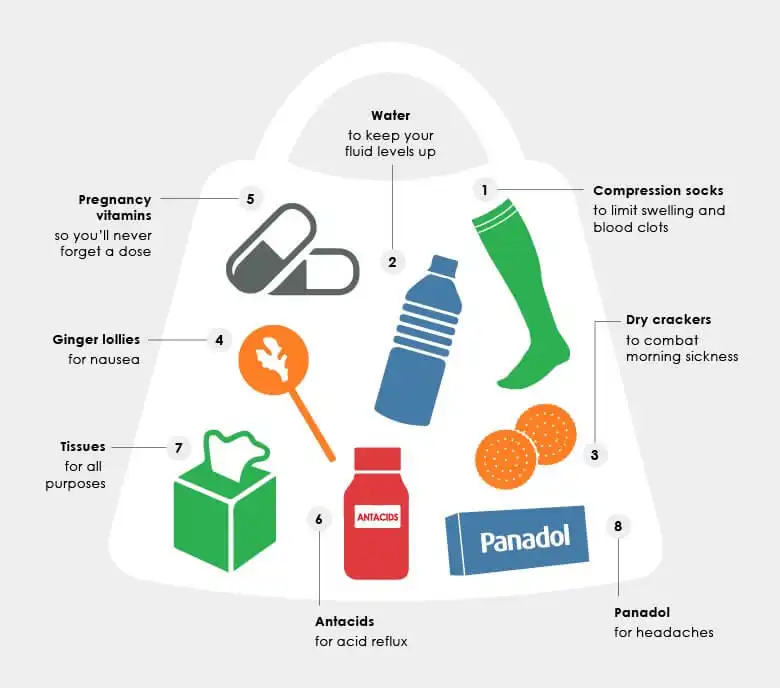
Travelling During Your First Trimester
OMG you’re having a baby!
You’ve had that positive pregnancy test and you’re on cloud nine but do you know the rules about flying and/or travel at all in your first trimester? We’ve got the answers!
Are you suffering from morning sickness and headaches and finding it hard to concentrate at work? A week(end) away in your first trimester could be just what the doctor ordered!
Speaking of doctors, most say it's perfectly safe to travel in your first trimester, but a little bit of pregnancy pre-planning can go a loooong way. There’s only nine months until your world is going to be turned upside down, so it’s time to get the holidays in before two becomes three.
Before You Go
Right now everything seems new and scary so it’s good to be as prepared as you can for your holiday. Visit your doctor before you book your trip as they might have some no-go destinations in mind. You’ll surely have a truckload of questions to ask your doctor so to sort you out we’ve provided you with a list of FAQs like:
- What destinations should be avoided and why?
- What activities should be avoided and why?
- What food and drink should be avoided and why?
- What pregnancy vitamins should you be taking?
- What medicines are safe to take for heartburn, thrush, constipation, food poisoning etc?
- What vaccinations do you need and which ones are not recommended?
- What are the most common pregnancy complications and what do I need to look out for?
- What to do if you suspect you are miscarrying?
- Any tips for long flights?
- Suggested morning sickness remedies?
How To Tackle Morning Sickness When Travelling
Feeling nauseous can make you feel glum, but there are remedies for that bilious tum!
Morning sickness is a normal part of pregnancy that has been known to affect over half of all expectant mums. The cause is due to a combination of high estrogen levels and a drop in blood sugar. It’s tricky to stop it altogether, but a few tips can stop it from ruining your trip. Whether you’re travelling by air, car or sea these handy helpers may prevent morning sickness from making you miserable.
- Stay clear of noxious odours - Certain smells will turn your tummy, so try to avoid any wiffy encounters if you can.
- Bring anti-nausea aids - Carry ginger lollies and peppermint tea with you on your travels – these combat nausea by soothing and settling the stomach. If you’re feeling the burn of acid reflux – reach for some Rennie. A handful of almonds have also been known to combat the fire of acid reflux.
- Medical treatments: If herbal remedies aren’t cutting it, it may be time to try over the counter medications like Emetrol (a non-prescription medication that’s safe for nausea). Anti-histamines can also be used to treat nausea as well as vitamin B6. Then there are the prescriptions meds like Zofran, Compazine and Phenergan. Always discuss any medications and potential side effects with your doctor.
- Keep hydrated - It’s more essential than ever to stay hydrated, as your body needs more water to cope with the demands of pregnancy. This is especially crucial in warmer climates.
- Avoid rich foods - Eat little and often, and stick to carb-heavy meals. Spicy, rich or creamy food can irritate the stomach lining.
- Keep active – You might be feeling sluggish but being physically active has been found to improve the symptoms of morning sickness. Avoid intense aerobic sessions and opt for slow, leisurely walks or gentle yoga.
- Comfort is everything – Go for loose, natural fibred clothing with plenty of extra room. Give the strappy sandals a miss and choose supportive, non-restrictive shoes. Your feet will thank you.
- Get into a good book – Distraction is key. If you’re a chick-lit gal now may not be the time for a historical melodrama. With your hormone levels skyrocketing and a dodgy tummy to deal with a good laugh may be the perfect remedy. Try light-hearted page-turners from authors like Marian Keyes and Liane Moriarty.
Sickness Tips For Travelling By Plane
- Seatbelt safety – For optimum comfort and safety, your seat belt should be fastened across the thighs and below the belly. You’re probably not going to need them in your first 12 weeks, but seatbelt extenders are available from the cabin crew on-board if you need the extra space.
- Stock up: Request extra sick bags if you’re feeling queasy when the seatbelt sign is turned on and you can’t make it to the restroom. It may sound ghastly but you’ll thank yourself later!
- Sit strategically: Request a seat with easy access to the restrooms, but not so close that foul odours can upset your stomach.
- Come prepared: Whether it’s antacids, ginger lollies or anti-nausea medication, it’s vital that all your remedies are easily accessible. An organised travel kit can ease your symptoms and offer you peace of mind.
- Bump in the flight: If turbulence sends your tummy in twists request a seat closer to the front of the plane where the air is slightly smoother. If you’re simply ravaged with nerves a good understanding of flight mechanics and lots of deep breathing can help.
Sickness Tips For Travelling In A Car
- Take breaks: Take regular stops to stretch and get some fresh air. It’s also good to move around frequently to keep your blood circulation going.
- Get ahead: Sit in the front passenger seat, not in the rear where motion sickness can often be exacerbated.
- Feel the breeze: Keep the windows wound down low and try to look out as much as possible; good ventilation and moving scenery can ward off nausea.
- Keep it cool: Bring a cooling cloth or ice pack of sorts to place on your forehead if you feel hot. This can be a godsend when you’re feeling feverish.
- Nice & snug: Secure your seat belt below your belly, low and snug on your hipbones. Shoulder straps can be bought to help with comfort if necessary.
- Opt for audio: If you’re prone to motion sickness ditch the paperback for an audio version. Looking down confuses your visual and aural senses, causing you to feel disoriented and sick.
Sickness Tips For Travelling On A Cruise
- Feeling queasy – take it easy. You’re on holiday to relax and unwind so make that is your top priority. You will most likely acclimatise to the motion of the boat in time. Go easy on organised activities until you find your ‘sea legs.’
- Shift your gaze: It may get repetitive, but staring out at sea can prevent seasickness. Your balance system will more quickly acclimatize itself if you can look out at the horizon and anticipate the boat’s movements. Additionally, If you’re sitting down, try and face the direction of travel.
- Sail low: If you can secure a room in the lower level cabins near the centre of a ship you’re more likely to have a smoother ride than those in the higher or outer cabins.
- Pace yourself: The all-you-can-eat-buffet may look tempting, but you could regret that binge-fest later. Sample small amounts of food and ask yourself if a third and fourth visit to the buffet is really necessary.
Pregnant Women And Vaccinations
It is important that pregnant women receive the necessary vaccinations before travelling. However, some vaccines are not safe to use in pregnancy. It’s vital to speak to your doctor or midwife before you go to see what’s recommended and whether it’s suitable. Mums to be should consider the risk/reward benefits before booking an exotic trip. 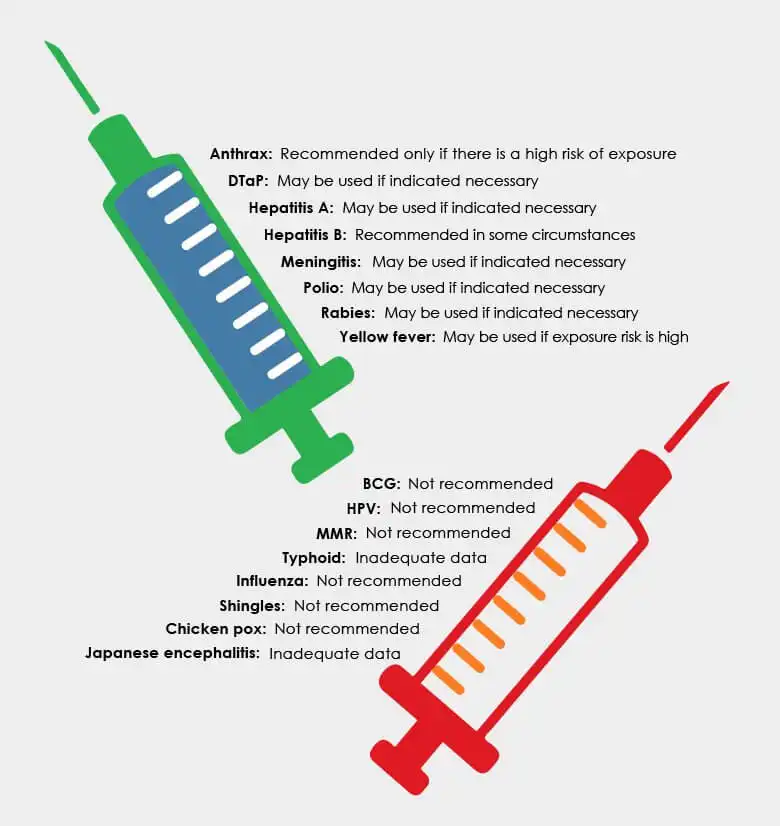
Disclaimer: This information is provided as a general only. Comparetravelinsurance.com.au takes all responsible care when preparing this information, but it does not warrant its accuracy over time. You should consult your doctor or midwife before deciding which vaccinations are right for you and your baby.
Where To Go When You’re Travelling With Bump?
Babymoons are all the rage and are growing in popularity each year. But the million-dollar question is…where to go?
If your previous holidays were full of hijinks it’s time to change gear. Adventurous, fast-paced travel is hardly ideal for expectant mothers who should focus instead on putting ‘zen’ at the top of their agenda. Destinations and activities with an emphasis on relaxation should be on your itinerary. Strenuous hikes and adventure sports should be ditched in favour of gentle exercises like yoga, walking and swimming.
For all the logical reasons, you would be advised to avoid regions with high travel warnings from the government, or those which carry a high risk of illness and disease. As we mentioned earlier, many immunisations are also not suitable for pregnant women so check with your doctor before making any rash destination decisions.
Whether you’re a city slicker, nature freak or beach bunny, there’s a destination that can be tailored to your specific needs. We’ve outlined nine of the most common holiday destinations for every type of expectant mum.
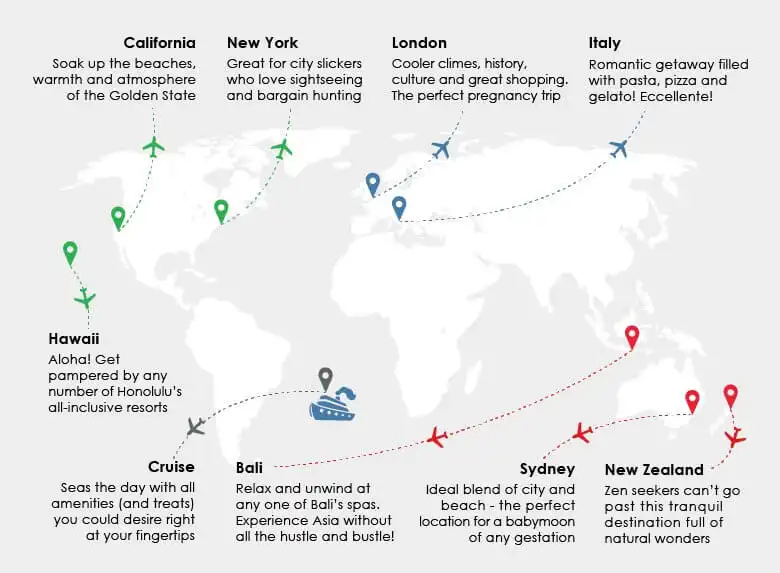
Travel During Your Second Trimester
Yahoo it’s time to put down the sick bag! For many women the second trimester (weeks 13-27) can be life-affirming and a great time to take-off on a babymoon.
During this period morning sickness has usually subsided and your energy levels are usually higher (due to increased hormone levels). Additionally, at this stage your ‘bump’ may be more visible, making it easier to get a seat on a train or access other amenities.
As you are now the proud bearer of a baby bump many airlines will require you to carry a doctor’s note at week 28 confirming the details of your pregnancy and any complications. Check your airline or cruise liner’s policy on pregnancy before you leave and don’t forget that it applies to your return trip too.
Second Trimester Travel Tips
Lookout week 13! You may be feeling sky high during the second trimester but you should still take care not to overdo things. At this stage you will want to consider destinations that cater to your needs. When planning your trip consider the following:
- Where you go: Where you travel can have a big impact on your safety. Developing countries, for example are not ideal during pregnancy due to their additional health risks. The vaccinations you may require for these regions may not be safe for pregnant women. Additionally, you are more likely to be at risk of contracting diseases like food poisoning and traveller’s diarrhoea in developing countries. Consider destinations that aren’t too far from home and have the same level of advanced medical care as back home.
- Weather wise: Are you a sweaty Betty? If you’re not a fan of warm climates note that you’ll probably suffer the heat more during pregnancy (as your body temperature rises). If a bit of sun and sand is exactly what you’re after consider destination like the Greek Islands or Hawaii. If you plan to travel to humid, bustling cities like Singapore or Hong Kong consider a hotel with a swimming pool so you can cool off easily.
- Comfort first: Yep- you have doctor’s order to indulge! Now is the time to utilize any facilities that will ensure you stay safe and comfortable. If your travel budget can handle it, get a flight upgrade or opt for a taxi over a crowded bus ride. It’s easy to exhaust yourself during this time and little luxuries can make all the difference!
- Fly at the pointy end: The front section of the plane is roomier and less turbulent than down the back. You will also be able to get on and off the aircraft quicker and enjoy better air circulation. Although many pregnant women prefer an aisle seat for easier access, some prefer a window seat to alleviate nausea.
- Make a plan: You’re pregnant which means a hunger pang or a trip to the bathroom can be a matter of life and death. You won’t feel like hunting around for a quick snack or search high and low for the restroom in a crowded tourist attraction. Plan your bathroom breaks strategically and make sure you always have a snack and water on hand.
- Take it easy: Got a hectic ‘to-do’ list for your trip? Cut it in half as you’ll most likely need more rest breaks than you anticipate. You may take twice as long making it through a museum and require plenty of downtime in between activities. Be kind to yourself and don’t try to do it all.
- Cruise alert: Ahh to sail the seven seas…while pregnant! Cruise holidays are increasingly popular, and cruising during pregnancy can be a great way to kick up your feet. However, it’s worth knowing that many popular cruises will only accept guests who are 24 weeks or less at the time of the cruise disembarkation (at the end of the cruise). Be sure to check in with your cruise company before you book as often refunds are not granted in these cases.
Travel During Your Third Trimester
You’re getting closer to the pointy end of pregnancy and you’re ping-ponging between lethargy to extreme euphoria.
Now is definitely time for some R&R- so what are your holiday options?
The third trimester (weeks 28-40) can be a challenging time to travel although plenty of women will still do so. Indeed, most airlines won’t let passengers on board after 36 weeks and cruise companies can be even more restrictive.
Of course, with the right information you can still travel safely in the third trimester- a period where many women are craving a little ‘me time’ before the big event.
Flight Facts
Every airline will differ in their pregnancy policies. The following is typical for most airlines
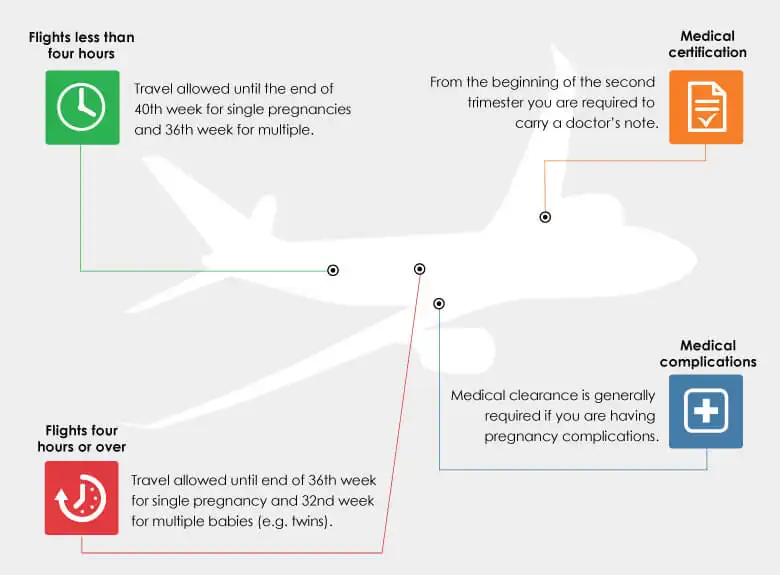
Cruise Control
Cruise lines can be quite restrictive when it comes to pregnancy travel. It’s worth noting that most cruise lines don’t allow pregnant women to sail starting around their third trimester. The following policies will usually apply for cruises:
- 24-week cut-offs: Most cruises will only accept guests who are 24 weeks or less at the time of the cruise disembarkation. Such cruise lines include Fred Olsen Cruise Lines, Celebrity Cruises, Carnival, AMA Waterways, Viking River Cruises, Swan Hellenic and P&O Cruises.
- 27-week cut-offs: A few cruises will allow guests to sail up to 27 weeks (at time of the disembarkation). These include Star Clippers and
- No cut-off date: A few specialty cruise liners have no formal written and will allow you to cruise throughout your third trimester. These include Cruise West . You will most likely need a doctor’s certificate to do so and be highly aware of the risks associated with travelling during this time.
Medical certification: All pregnant women onboard a cruise ship are usually required to produce a doctor’s or midwife’s letter stating that mother and baby are in good health, fit to travel and that you are not high risk. The letter must also include the estimated date of delivery (EDD) calculated from both the last menstrual period (LMP) and ultrasound (if performed). This documentation must be returned to the cruise company at least 60 days prior to the cruise departure (this will vary so check with your cruise company).
Before You Book
It’s never too late to turn back…on your travel plans that is! However, it’s absolutely crucial to tell your travel agent, airline or cruise line how far along you are and how far you will be at the time of the flight. You will then be informed as to whether you will be allowed to travel. When booking package holidays be sure to query which airlines or cruise companies you will be travelling with so you can plan accordingly.
Travelling With Cruise And Airline Restrictions
Before booking a cruise or flight in your third trimester, you will need to talk to your doctor. Any complications will most likely prevent you from travelling.
Even with flight and cruise restrictions there are plenty of ways to holiday safely during your third trimester. These include:
- Road trips: Reckon little bub’s got a driving edge? Road trips are perfect for those last few months of pregnancy. If you only have a few days, don’t plan to go too far; pick a place you can get to in less than two hours with plenty of rest breaks.
- Staycations: How often do you really make time to enjoy your neighbourhood? This may be the perfect time to take on your local area and explore new cafes, parks and areas. You’ll also save yourself the headache of being too far from home should you require medical assistance.
- Train it: The rhythmic, back and forth motion of the train tracks have been reported to have a soothing and relaxing effect on expectant mothers. Both comfortable and usually roomier than a cramped airline cabin, train travel can be just the ticket when flights and cruises are off limits.
- Spa weekend: There’s no better time than now to indulge in TLC. After suffering with heartburn, bloating and a myriad of other late pregnancy symptoms, a weekend of massages, pedicures and gentle swims can be the perfect solution. Do your research before booking a babymoon spa trip and stay clear away from steam rooms, hot tubs and any contra-indicated aromatherapy oils.
Driving Easy
With flights often ruled out for women in their third trimester, road trips are often the holiday of choice. The following are some tips to stay safe and ease the comfort of driving during the third trimester.
- Belt up: Wearing your seatbelt is absolutely essential (at all times) during pregnancy. In the event of an accident, it can save both you and your belly from hitting the dashboard. According to the National Highway Traffic Safety Administration (NHTSA), the best way to wear your seatbelt is with the shoulder belt placed over the collarbone and across your chest and the lap belt as low as possible on the hips and under the abdomen.
- Safety cushion: Many women fear the impact of an airbag on their pregnant bellies but they needn’t worry. In the event of a collision, you’ll be much safer with an airbag than without one. The American Congress of Obstetrics and Gynecology (ACOG) suggests leaving at least 10 inches between your breastbone and the steering wheel. Any closer and you can risk injuring your ribs and belly in a collision.
- Break it up: Just like you would on any long journey, take frequent breaks. It hardly needs to be said, but you’ll definitely require frequent restrooms stops. Use those opportunities to move around and stretch any tired, aching muscles. Little walks every so often will also help to boost your circulation and prevent blood clots.
- Rest and ride: Driving for long stretches at a time shouldn’t be a painful ordeal. Bring a pillow to act as a headrest or back support when you need it. As well, comfortable shoes, support stockings and light, natural fabrics like cotton or wool may not be stylish, but they’ll help to keep you calm and in control. The last thing you need is a tight waistband or constricting shoes during a long car trip.
Managing Third Trimester Symptoms
You’re in the home stretch of pregnancy and the end is so close- yet symptoms like fatigue and heartburn can make it seem very far. Here’s how to manage those third-trimester aches and pains.
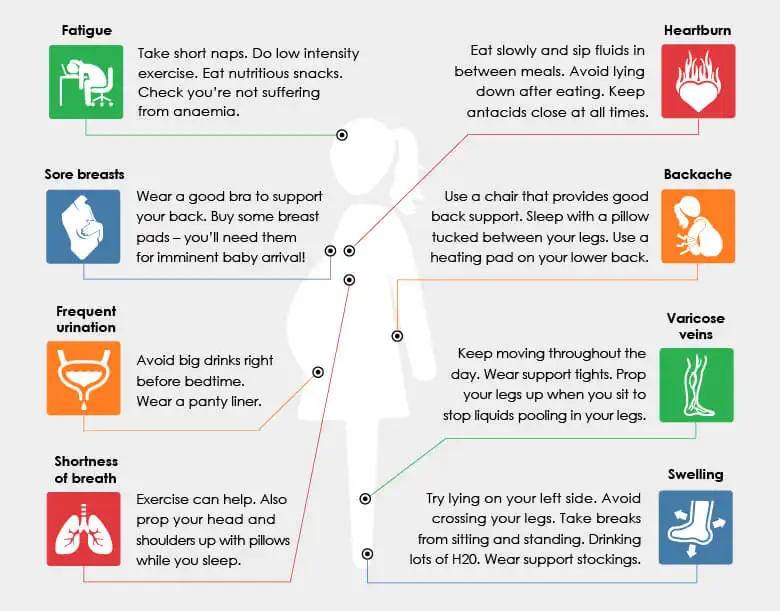
- Fatigue: You may have felt tired throughout your pregnancy but that’s nothing on the type of exhaustion that’s hitting you now. With up to 30 pounds of extra weight on your body and your vital organs all feeling the strain, it’s no wonder all you want to do it sleep. Keep your energy levels up with short naps, low-intensity exercise and nutritious snacks. Listen to your body and don’t push yourself if all you want to do is curl up on the couch. Consider talking to your doctor if you’re feeling week as you may be suffering from anaemia, a common condition during pregnancy.
- Heartburn: This one may have struck before but it’s now hitting you harder than ever. Again, hormones are the culprit for directing harsh acids back up towards your oesophagus, causing that sharp, burning feeling. As well, your shifting uterus will be pushing your stomach upwards, increasing the pain. To ease the discomfort, steer clear away from trigger foods like tomatoes, citrus fruit, chocolate, garlic, onion and anything spicy or fried. Attempt to eat small, frequent meals as opposed to three large meals a day. Eat slowly and sip fluids in between meals. Avoid lying down after eating.
- Swelling: Thanks to fluid retention and changes in your blood chemistry your ankles, hands and legs are likely feeling puffy and swollen. Pressure from your growing uterus on your pelvic veins are also causing blood to pool in your legs, increasing the fluid in your feet and ankles. You can help relieve the pressure by lying on your left side (as the vena cava- the large vein that delivers blood from your legs) is on the right side of your body. Avoid crossing your legs and try to raise them as much as possible (try using a stool or a pile of books). Take breaks from sitting and standing as much as possible. Drinking loads will also help your body retain less water and popping on waist-high support stockings in the morning can prevent blood pooling around your ankles.
Special Provisions
There are perks to pregnancy other than glossy hair and radiant skin!
Ring ahead as often you will be entitled to special allocations and services. For instance, some airlines will provide you with choice seating, wheelchair escorts and other conveniences not usually offered to passengers.
On long flights you may even be treated to luxuries like hot towels, lotions, eye masks and more.
It’s always good to speak up before checking in at your hotel, additional comforts like extra pillows and bubble bath may come in super handy!
Pregnancy And Travel Insurance
So you’ve decided to take the plunge and head off a well-deserved break. But what about holiday cover for you and your growing bump?
Travelling while pregnant can be nerve-racking. Having the right policy for your holiday is always important, especially so when you’re expecting. And whilst travelling with a bun-in-the-oven is no longer a barrier to travel, it can be tricky to find travel insurance when pregnant….but lucky for you we’ve got the answers.
What’s Covered?
- Overseas medical expenses: Expecting a child makes you more vulnerable than the average traveller to potential risk. If you require medical care overseas your policy will be there to protect you, but not always to your newborn baby if it were to be born prematurely.
- Trip cancellation: On the off-chance you do need to cancel your trip and hurry home for a close relative family emergency, travel insurance will have you covered.
- Luggage & personal effects: Your luggage and personal effects will be replaced should they become lost, stolen or damaged during travel.
- Accommodation and travel expenses: If, due to an insured reason your flight home is delayed or cancelled, you’ll be covered for any additional accommodation and travel expenses.
And much more...
What’s Not?
It’s important to remember that exclusions apply to most policies whether you’re pregnant or not. In regard to pregnancy, most insurers have cover limits and/or conditions of cover relating to gestation, pregnancy-related complications and multiple babies… so it pays to do your research!
Some insurers consider pregnancy to be a pre-existing medical condition and a medical assessment may be required before you are covered. Others cover uncomplicated pregnancies up to a certain gestation without any fuss, and there are many insurers that simply will not cover pregnancy-related complications at all.
- Gestation: Each insurer will state the maximum number of weeks you are allowed to travel in their Product Disclosure Statement. These tend to be anywhere between 20-32 weeks, but 26 weeks is generally the standard. If you do travel over this time permitted you will be doing so without travel insurance protection. A handful of insurers allow you to pay an additional premium to increase the gestation time limits, but this rarely goes beyond 30 weeks.
- Pregnancy-related complications: Pregnancy complications are defined as “Any secondary diagnosis occurring prior to, during the course of, concurrent with, or as a result of the pregnancy, which may adversely affect the pregnancy outcome.” Woah that was a mouthful! In a nutshell, some insurers simply do not cover pregnancy-related complication at all, whereas others may require a medical assessment before cover can be grated. Pregnancy complications could be anything from toxaemia (toxins in the blood) to pre-eclampsia (where you develop high blood pressure, carry abnormal fluid and have protein in your urine during the second half of pregnancy). All will be detailed in the small print, so it’s best to give that a wiz before signing on the dotted line.
- Multiple babies: Cover limits can be restricted when mums-to-be are expecting twins or multiple babies.
For care of a newborn child and/or regular antenatal care: If you give birth prematurely whilst on holiday most insurers do not cover medical fees for your newborn baby.
If you travelled against doctor's advice: If you were not fit to travel, and you did it anyway, you’d be on your own in terms of cover.

Natalie Smith
Having travelled to over 40 countries, studied tourism management and worked as a flight attendant for over three years, Natalie knows more than a thing or two about travel! She’s an adventure-lover, whose favourite trips have been trekking Machu Picchu and volunteering in an animal shelter in the Amazon. Qualified in Tier 2 General Insurance General Advice and specialising in travel insurance for the last five years, she in passionate about helping travellers get the most out of their holiday.
trending tips and guides

Pre-existing Medical Conditions
Having pre-existing medical conditions doesn't mean you can't get cover or that it has to be expensive. It simply means that you need to dig a little deeper when doing your research.

Pregnancy Travel Insurance Guide
Not all insurers will cover you automatically if you’re over 22 weeks gestation or have had pregnancy complications. See which companies offer cover for pregnant women.

Finding travel insurance when you have diabetes
It may be tricky to find travel insurance that covers diabetes, but that's why we're here!








